Home and Away: recommended refugee and migrant stories from around the world
By Mairi Kidd, consultant for education and arts projects.
Have you ever read a novel set in a place you know, by an author who knows it less well, and thought, ‘no, that’s not quite right’? It happens to me with books set in particular parts of Scotland. The story may rattle along, the breadth of ambition may be breathtaking, the language stunning, but the detail is just off. It jars, and it makes me wonder about historical fiction, or – let’s pick a book at random - Captain Corelli’s Mandolin. Fiction is an imaginative act, yes, but also one in which people, places and times are viewed through the prism of an author’s own experience. How much does this skew the experiences presented?
Who writes books about refugees?
This was in my mind when Amnesty asked me to look at the books we recommend to young people and teachers, parents and other adults wishing to read about refugee and migration experiences. Are the lists truly diverse? Are there stories by people who have experienced what it is to migrate to a new country, or to become a refugee?
Why does it matter?
The answer, as you will perhaps anticipate if you have not spent the last hundred years on Mars, is that books on refuge and migration in the main conform to the normal practice of the UK publishing industry – which is to say that they are generally authored by white, middle class people living south of the Watford Gap. It's important to stress that these are good, caring, imaginative and talented people who are angry and distressed by the realities facing refugees and migrants and who write their books to help change the world. And many of the books are really good. So what’s the problem?
Research v normal
My friend Suj summed it up for me recently when I told him about a European friend’s horror at the Home Office as she applied for citizenship after her marriage. ‘People from Europe and the UK are finding out what it’s like for the rest of us now,’ Suj said. He then listed the routine discrimination he suffers in dealings with officials anywhere because of the colour of his skin and the country in which he was born. But he doesn’t expect anything else. Of course the white people on his plane get a visa for Dubai when there’s an unscheduled stop-over while he gets to stay in effective detention in a grotty room in the airport. That’s his normal. And unless we have books in which a range of people write their normal, we don't have diversity, and the big risk is we don’t have authenticity either.
Many authors do, of course, conduct extensive research including interviews and other work with people affected by the issues in their books. Francesca Sanna did so for The Journey, for example. But The Journey is not in this list. Instead we have focused almost exclusively on authors who have personal experience of migration or as refugees, or whose families have this experience. For my money, many of the books are harder than UK-originated fictions. Perhaps that’s because in writing fiction, an author chooses how far to go and that choice is not given in real life. The characters here are diverse, well fleshed-out and human. As real people they have normals. Often they have no idea what’s coming and – sometimes - limited understanding when it does.
One book on the list is a novelisation of a young refugee’s experience as told to an Italian journalist; this seemed to us a valid means of publishing a refugee voice. There is also one book originally published in Chinese and another still only available in a Spanish edition where we know little of creators’ backgrounds but considered the perspectives in themselves diverse.
We hope you find the list useful. There’s a lot of detail about the books but the list itself is quite short because - it must be said again and again - there are not nearly enough diverse children’s books in the UK.
For readers aged 3+
A New Year's Reunion, Yu Li-Qiong (author) and Zhu Cheng-Liang (illustrator)
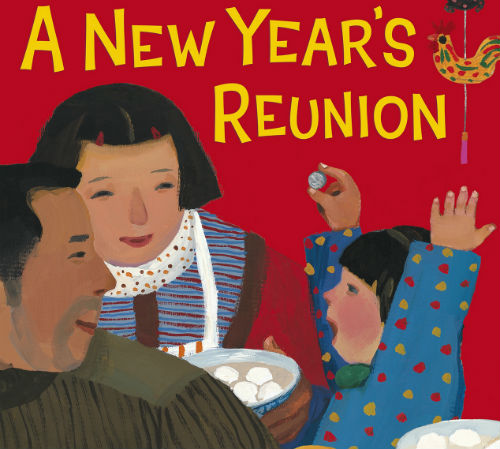 Maomao’s father builds houses in places far away from home. Maomao and Mama see him only at New Year, when he travels back so that the family can be together for the most special of holidays. Maomao looks forward with great excitement to seeing Papa and sharing holiday traditions, although she is naturally a little shy when at last Papa arrives. Maomao is delighted to find the lucky coin Papa has hidden in a sticky rice ball, and decides to give it back, so that Papa may keep it with him until he can come home for the holiday again next year.
Maomao’s father builds houses in places far away from home. Maomao and Mama see him only at New Year, when he travels back so that the family can be together for the most special of holidays. Maomao looks forward with great excitement to seeing Papa and sharing holiday traditions, although she is naturally a little shy when at last Papa arrives. Maomao is delighted to find the lucky coin Papa has hidden in a sticky rice ball, and decides to give it back, so that Papa may keep it with him until he can come home for the holiday again next year.
A memorable portrait of China’s most important holiday and of the hardship facing migrant workers and their families, with accessible text and beautiful gouache illustrations rich in cultural detail. The creators do not shy away from portraying Mama’s strain and sadness as Papa packs to leave, joining an estimated 100 million individuals in China who work far from home and return to visit their families only for the New Year holiday.
Yu Li-Qiong and Zhu Cheng-Liang both live and work in Nanjing and A New Year’s Reunion was originally published in China.
Walker Books, paperback, £6.99, ISBN 9781406338577
For readers aged 6+
Here I Am, Patti Kim (author) and Sonia Sánchez (illustrator)
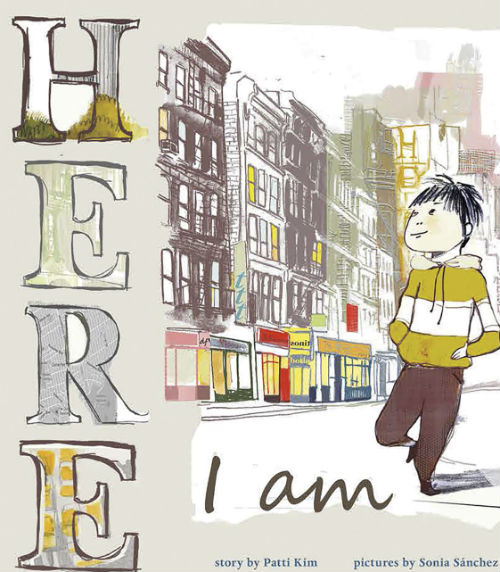 A child and his family migrate to a new country far away. Their new city is busy and bustling with traffic, lights and noise all around. The people speak a different language, eat different food, make different gestures and play different games. The child clings to his keepsake from home – a seed - as he takes his first tentative steps towards exploring his new environment. When he drops the seed from the window and sees it caught by a girl of his own age, he is encouraged to explore the city and find friendship in his new home.
A child and his family migrate to a new country far away. Their new city is busy and bustling with traffic, lights and noise all around. The people speak a different language, eat different food, make different gestures and play different games. The child clings to his keepsake from home – a seed - as he takes his first tentative steps towards exploring his new environment. When he drops the seed from the window and sees it caught by a girl of his own age, he is encouraged to explore the city and find friendship in his new home.
A near-wordless and highly accessible portrait of migrant experience that cleverly contrasts an opening of bright, light-filled rural settings with a grey cityscape to reflect the anxiety and loneliness of the young migrant child in his unfamiliar new home. The setting is Asia/America but the story is universal; Kim includes an afterword that details her own experiences on migrating from Korea to the USA as a child in the 70s.
Here I Am! is ideal for developing visual literacy skills and for use with mixed-ability groups and with EAL learners. It was originally published in the USA.
Curious Fox, paperback, £6.99, ISBN 9781782022268
Pancho Rabbit and the Coyote: A Migrant’s Tale, Duncan Tonatiuh
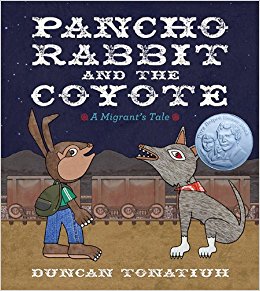 Papá Rabbit leaves home to seek work in the great carrot and lettuce fields of the north. He is due to return two years later, but when the allotted day passes with no sign of Papá, Pancho sets out to find him. A coyote offers his help, but at every stage of the journey he extracts payment. Tonatiuh effectively exploits the elements of classic fable to create a palpable sense of danger as Pancho and his untrustworthy guide journey through the harsh landscapes of the Mexican/American border. The bittersweet ending reminds the reader that there are no easy solutions for those living in extreme poverty.
Papá Rabbit leaves home to seek work in the great carrot and lettuce fields of the north. He is due to return two years later, but when the allotted day passes with no sign of Papá, Pancho sets out to find him. A coyote offers his help, but at every stage of the journey he extracts payment. Tonatiuh effectively exploits the elements of classic fable to create a palpable sense of danger as Pancho and his untrustworthy guide journey through the harsh landscapes of the Mexican/American border. The bittersweet ending reminds the reader that there are no easy solutions for those living in extreme poverty.
Tonatiuh’s striking visuals combine line-work inspired by ancient Mexican art with modern digital textures, emphasising the real-world resonances of the story. The book includes an afterword explaining that the word coyote is used in Spanish as slang for a people smuggler. Tonatiuh contrasts his own experience of relative privilege - he has an American father and dual citizenship - with the experiences of his friends and neighbours in Mexico, many of whom have risked illegal crossings into the United States.
Pancho Rabbit is accessible to very young readers while containing sufficent depth for classroom exploration with more mature learners. It was originally published in the USA.
Abrams, hardcover, £10.99, ISBN 9781419705830
8+ readers
When Hitler Stole Pink Rabbit, Judith Kerr
Anna is a chatty and precocious nine-year-old living in Berlin. Her father is a famous writer and although this initially concerns her only because she is worried that families rarely produce two famous people, his outspoken criticism of the Nazi regime soon brings unwanted attention. After he flees to Switzerland, Anna, her mother and her brother make their own perilous journey out of Germany to join him. As Europe becomes more and more dangerous for Jews the family move on to France and ultimately England.
When Hitler Stole Pink Rabbit is rightfully a classic. On the surface it is a simple story of a refugee journey, told with some humour as Anna struggles with strange languages and customs, temporary lodgings and new friends. But there is a much darker undertow and more mature readers will see that resilient, upbeat Anna does not quite grasp the dangers she faces, the desperate distress of her parents or the dreadful fate of the friends they have left behind.
Kerr’s father Alfred was an influential critic in Weimar Germany and Anna’s experiences are fictionalised versions of Kerr’s own. The book and its two sequels were intended by the author to explain her early experiences of her children and make for rewarding reading for ages 8+ – teenagers and adults should not miss out. It can be read as a companion piece to Anne Frank’s Diary of a Young Girl.
Harper Collins, paperback, £6.99, ISBN 9780007274772
The Island, Armin Greder
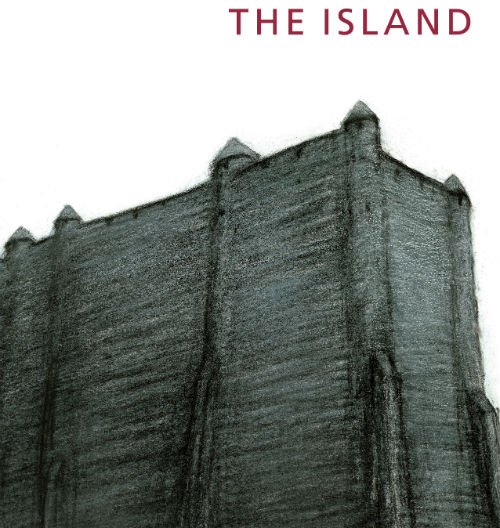 When ‘fate and currents’ wash a stranger’s raft ashore on the island, the islanders are deeply suspicious. Keen to ensure that their own routines are not interrupted, they house him in a goat pen and refuse him work. When he escapes in search of food, a brief discussion of how they might care for him becomes a catalogue of reasons why they cannot. Fears grow and magnify until the newcomer becomes an object of hatred, and the islanders decide to force him into the sea. Once this task is complete, they turn on a fisherman who initially spoke for him and then build a wall around the island.
When ‘fate and currents’ wash a stranger’s raft ashore on the island, the islanders are deeply suspicious. Keen to ensure that their own routines are not interrupted, they house him in a goat pen and refuse him work. When he escapes in search of food, a brief discussion of how they might care for him becomes a catalogue of reasons why they cannot. Fears grow and magnify until the newcomer becomes an object of hatred, and the islanders decide to force him into the sea. Once this task is complete, they turn on a fisherman who initially spoke for him and then build a wall around the island.
The Island is a picture book for older readers, with uncompromising artwork and sparse text. It is a powerful and chilling allegory about refugees, racism and fear of the other.
A Swiss immigrant to Australia now living in Peru, Greder’s work often focuses on attitudes to migrants and refugees; a recent A B C of Australia, for example, has ‘Boat People’ under B. The Island was originally published in German and is somewhat European in style, reminiscent of Munch and European expressionism more widely, and therefore lending itself to both universal and particular readings.
Allen & Unwin, hardcover, £11.99, ISBN 9781741752663
For readers aged 12+
The Pavee and the Buffer Girl, Siobhan Dowd (author) and Emma Shoard (illustrator)
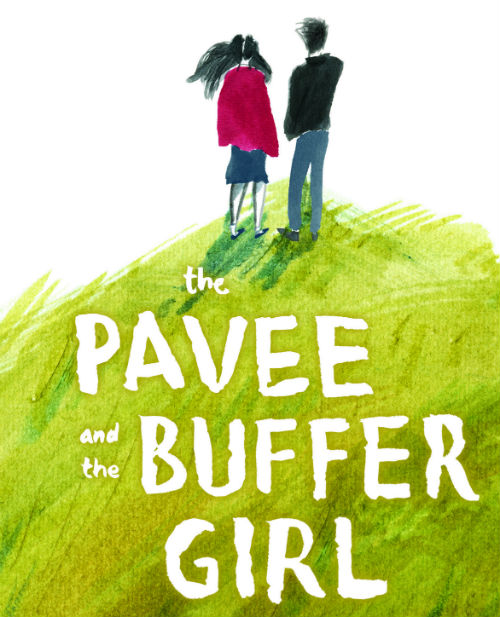 Young Jim Curren and his extended family of travellers have halted by the town of Dundray and after a visit from the authorities threatening legal action, the children have been enrolled in the local school. Bullying of the ‘tinker dirt’ is rife, but Jim finds solace in the friendship of local ‘buffer’ (settled) girl Kit. With Kit’s friendship and reading lessons Jim finds life in Dundray almost bearable, but a sustained campaign of persecution sees the travellers decide to move on.
Young Jim Curren and his extended family of travellers have halted by the town of Dundray and after a visit from the authorities threatening legal action, the children have been enrolled in the local school. Bullying of the ‘tinker dirt’ is rife, but Jim finds solace in the friendship of local ‘buffer’ (settled) girl Kit. With Kit’s friendship and reading lessons Jim finds life in Dundray almost bearable, but a sustained campaign of persecution sees the travellers decide to move on.
The Pavee and the Buffer Girl reminds the reader that ‘home’ has different meanings for different people. In a literal sense Jim’s home is a caravan; in another it is the love and support of his family, and especially his Ma and Da. In a very important sense he has no home; modern land and education laws and widespread prejudice against travellers restrict the travellers’ movement and deprive them of stopping places. Emma Shoard’s artwork sings with the beauty of the Irish landscape, underscoring the point that Jim’s family has nowhere to rest in their ancestral home.
Born in England to Irish parents, Siobhan Dowd was a campaigner for human rights and a writer exquisitely sensitive to the realities of life for Irish immigrants, travellers and the disposed.
The Bucket List, paperback, £12.99, ISBN 9781911370048
Tall Story , Candy Gourlay
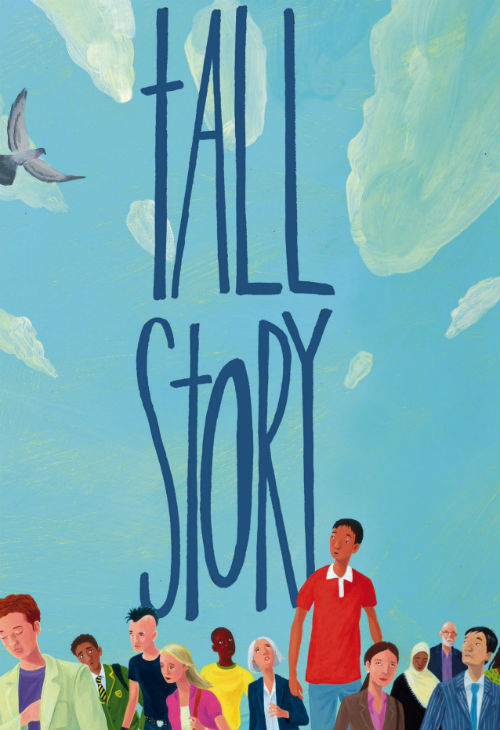 Andi is a basketball whizz living in the UK; her half-brother Bernardo is an extremely tall teenager living with his aunt and uncle in the Philippines. He shares a name with a giant who, legend has it, protected his village from a major earthquake. Bernardo dreams of joining Andi, their mother and her husband in the UK, but immigration issues have prevented him until now. At last he has the paperwork he needs and is able to be with his family. But Bernardo has a lot of adjusting to do – he has never seen a bath or an electric kettle, and no one in England has seen an eight-foot-tall boy from the Philippines before.
Andi is a basketball whizz living in the UK; her half-brother Bernardo is an extremely tall teenager living with his aunt and uncle in the Philippines. He shares a name with a giant who, legend has it, protected his village from a major earthquake. Bernardo dreams of joining Andi, their mother and her husband in the UK, but immigration issues have prevented him until now. At last he has the paperwork he needs and is able to be with his family. But Bernardo has a lot of adjusting to do – he has never seen a bath or an electric kettle, and no one in England has seen an eight-foot-tall boy from the Philippines before.
This warm, magical novel is told in alternative chapters by Andi and Bernardo, charting the time before they meet and Bernardo’s first weeks in the UK. Both siblings have their battles to fight, from Andi’s clashes with sexism, school and her parents to Bernardo’s struggles with English, Filipino superstitions back home and guilt over leaving.
Gourlay moved from the Philippines to the UK to pursue her writing career and in her first novel deftly weaves themes of cultural identity, poverty, immigration and integration into a narrative of magic and family love.
Random House, paperback, £6.99, ISBN 9781848531376
Between Shades of Grey, Rupa Sepetys
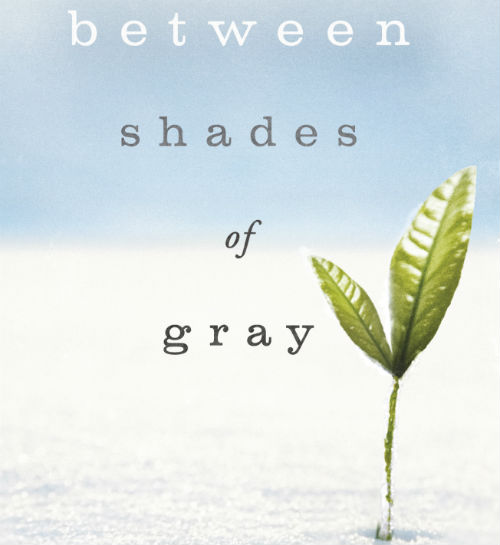 15-year-old Lina, her mother and her brother have moments to prepare to leave their comfortable lives in Lithuania for the horror of a work camp in Siberia. Lina is taken in her nightgown; this is a mere prelude to the ways in which she will be stripped of her dignity and the most basic of rights. Within weeks the fragmented family is barely existing – frozen, starved, and worked almost to death in the most inhospitable of environments. Love of family, friends, country and life itself sustains Lina, and although she cannot tell her story openly once she is freed, she documents her experiences in word and image and buries them in a jar in the hope they will one day come to light.
15-year-old Lina, her mother and her brother have moments to prepare to leave their comfortable lives in Lithuania for the horror of a work camp in Siberia. Lina is taken in her nightgown; this is a mere prelude to the ways in which she will be stripped of her dignity and the most basic of rights. Within weeks the fragmented family is barely existing – frozen, starved, and worked almost to death in the most inhospitable of environments. Love of family, friends, country and life itself sustains Lina, and although she cannot tell her story openly once she is freed, she documents her experiences in word and image and buries them in a jar in the hope they will one day come to light.
Between Shades of Grey is a story of desperate journeys both literal and metaphorical, of extreme hardship and of human resilience. It is the story of genocide, and of the frequently devastating human consequences of political upheaval – in this case, when Lithuania, Latvia and Estonia disappeared off the map in 1940.
Sepetys wrote Between Shades of Grey after learning of the mass deportations from Lithuania in 1941 (and later in 1945-52) from family members. The deportations saw around 130,000 people, mostly women and children, transported to labour camps and other forced settlements in remote parts of the Soviet Union. Deportations were intended both to provide forced labour in sparsely inhabited areas and to suppress anti-Soviet resistance in Lithuania. Sepetys’s own family’s first-hand accounts inform the novel.
Puffin, paperback, £6.99, ISBN 9780141335889
In the Sea there are Crocodiles, Fabio Geda, Howard Curtis (translator)
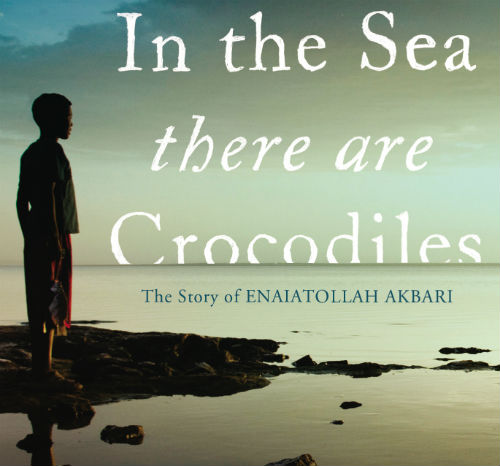 Enaiatollah’s people – the Shia Muslim Hazara - are oppressed by the Pashtun Sunni Muslims of Afghanistan. At the age of 10, Enaiatollah Akbari lost his father to an attack by bandits as he undertook a forced mission. The Pashtun threatened to take Enaiatollah as compensation for his father’s death. In desperation, his mother smuggled him into Pakistan, before returning home to her other children. Alone in a strange country, Enaiatollah had to embark on a series of back-breaking and exploitative jobs to earn enough to pay people-traffickers to take him to Europe. When, five years later, he was finally granted asylum in Italy, he met novelist Fabio Geda, who tells his story in this bestselling novelisation.
Enaiatollah’s people – the Shia Muslim Hazara - are oppressed by the Pashtun Sunni Muslims of Afghanistan. At the age of 10, Enaiatollah Akbari lost his father to an attack by bandits as he undertook a forced mission. The Pashtun threatened to take Enaiatollah as compensation for his father’s death. In desperation, his mother smuggled him into Pakistan, before returning home to her other children. Alone in a strange country, Enaiatollah had to embark on a series of back-breaking and exploitative jobs to earn enough to pay people-traffickers to take him to Europe. When, five years later, he was finally granted asylum in Italy, he met novelist Fabio Geda, who tells his story in this bestselling novelisation.
Enaiatollah’s story combines harrowing detail with an upbeat child narrator voice and is hugely informative regarding the experiences of young asylum seekers. It is by turns horrifying, funny and touching and is a testament to Enaiat’s resilience.
There are resources available from Amnesty International UK here.
Random House, paperback, £6.99, ISBN 9781849920988 9781849920988
The Wheel of Surya, Jamila Gavin
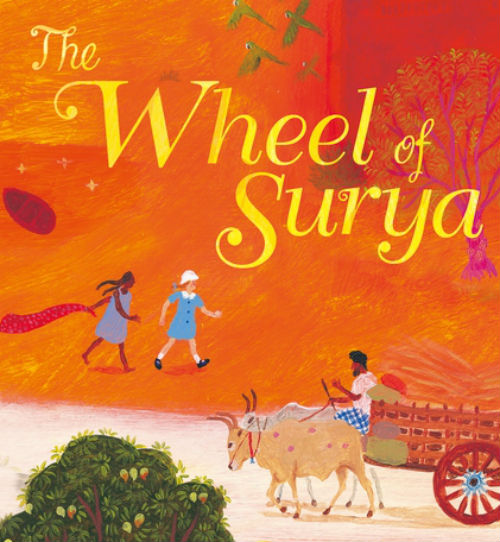 As India is rocked by the Independence movement and partition with Pakistan, Marvinder and Jaspal’s village in the contested Punjab is burned to the ground. Marvinder barely manages to save Jaspal’s life and amid terrible violence they are separated from their mother and all they know. Determined to reach their father in England, Jaspal and Marvinder must make their way to Bombay, a difficult journey in which they are unexpectedly aided by a Muslim traveller. The siblings eventually reach England, but they discover a hostile, post-war world that in no way matches the stories they have heard from their mother of a Promised Land.
As India is rocked by the Independence movement and partition with Pakistan, Marvinder and Jaspal’s village in the contested Punjab is burned to the ground. Marvinder barely manages to save Jaspal’s life and amid terrible violence they are separated from their mother and all they know. Determined to reach their father in England, Jaspal and Marvinder must make their way to Bombay, a difficult journey in which they are unexpectedly aided by a Muslim traveller. The siblings eventually reach England, but they discover a hostile, post-war world that in no way matches the stories they have heard from their mother of a Promised Land.
Gavin touches on culture, class, faith and family in the first book of an epic trilogy set against the chaos of Partition. Originally published in the 1990s, it was reissued in 2011 and remains one of the very best children’s books about the aftermath of colonial rule in India.
Jamila Gavin was born in Mussoorie, India, to an Indian father and an English mother.
Egmont, paperback, £6.99, ISBN 9780749747442
Alpha, Bessora (author) and Barroux (illustrator)
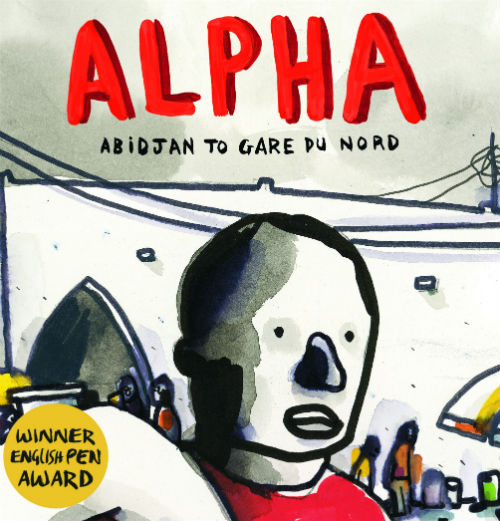 Alpha Coulibaly has paid people traffickers to take his wife and child from Abidjan in Cote D’Ivoire to the Gare du Nord in Paris. He has heard nothing from them since they left Abidjan. After yet another abortive attempt to secure a visa, he sells his home and business to pay the traffickers for his own passage. Unable to take any direct route, he criss-crosses Africa by car, bus and foot over many months, working illegally and lodging in refugee camps until a perilous boat journey brings him to Europe.
Alpha Coulibaly has paid people traffickers to take his wife and child from Abidjan in Cote D’Ivoire to the Gare du Nord in Paris. He has heard nothing from them since they left Abidjan. After yet another abortive attempt to secure a visa, he sells his home and business to pay the traffickers for his own passage. Unable to take any direct route, he criss-crosses Africa by car, bus and foot over many months, working illegally and lodging in refugee camps until a perilous boat journey brings him to Europe.
Alpha is an unflinching portrayal of the realities facing those seeking sanctuary from poverty and violence. There is a focus on individual stories, from the child Augustin, handed over by his sister in desperation when their mother is imprisoned, to Abebi, who cannot undertake the same earning opportunities as the men and has resorted to paying for her passage through prostitution.
Acclaimed artist Barroux grew up in Morocco and conceived of Alpha as an antidote to romantic depictions of the African bush and wildlife in books for young people. He collaborated with Bessora, a previous winner of the Grand prix littéraire d'Afrique noire to tell the story in graphic novel format. Initial inspiration came from the experiences of Togola, an asylum seeker Barroux met in his Paris studio building.
The Bucket List, hardback, £16.99, ISBN 9781911370017 and paperback, £12.99, ISBN 9781911370000
Refugee Boy, Benjamin Zephaniah
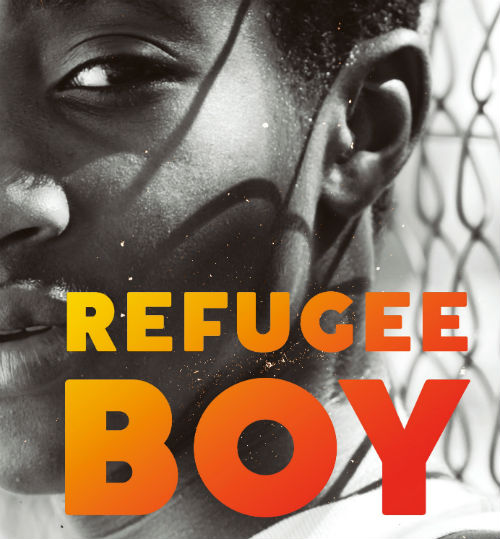 Alem and his father are embarking on the trip of a lifetime – they have flown from Ethiopia to Heathrow and have spent a whole day exploring the great city of London. Alem would like to be an architect and spends his day dreaming of the buildings he might one day create. The next morning, Alem awakens to find himself alone. His father has abandoned him in England in the hope he will be granted refugee status, sparing him from the danger he faces at home as the child of an Ethiopian/Eritrean marriage. The hotel owner arranges for Alem to be taken into care. First he is sent to a children’s home and then to a foster family, which is blessedly supportive of the abandoned boy who speaks English only as a second language. But after months of wrangling, it is determined that no immediate threat exists to Alem at home, and he is notified that his application for asylum has failed.
Alem and his father are embarking on the trip of a lifetime – they have flown from Ethiopia to Heathrow and have spent a whole day exploring the great city of London. Alem would like to be an architect and spends his day dreaming of the buildings he might one day create. The next morning, Alem awakens to find himself alone. His father has abandoned him in England in the hope he will be granted refugee status, sparing him from the danger he faces at home as the child of an Ethiopian/Eritrean marriage. The hotel owner arranges for Alem to be taken into care. First he is sent to a children’s home and then to a foster family, which is blessedly supportive of the abandoned boy who speaks English only as a second language. But after months of wrangling, it is determined that no immediate threat exists to Alem at home, and he is notified that his application for asylum has failed.
Refugee Boy is a difficult but uplifting story that offers a personal perspective on big issues. It is hopeful in its depiction of the capacity of young people to overcome difficult and frightening realities and to retain their belief in a better future. Amnesty International UK has resources to support the use of the book in the classroom, available here.
Birmingham-born Zephaniah is the son of a Jamaican mother and a Barabadian father and was inspired to write Refugee Boy after experiencing conflict in Lebanon.
Bloomsbury, paperback, £7.99, ISBN 9780747550860
Mairi Kidd works as a consultant for education and arts projects, with a particular interest in accessibility. Her involvement in children's publishing most recently saw her run the accessible fiction specialist house Barrington Stoke and she also works extensively in Scottish Gaelic.
Our blogs are written by Amnesty International staff, volunteers and other interested individuals, to encourage debate around human rights issues. They do not necessarily represent the views of Amnesty International.
These are great books according to age and I love to read the way you guy explain, I find out the major issue is cash flow and finance, we hardly manage these things and we need consultancy fo that, I refer a firm who provide consultancy services in minimal cost and have chartered accountant in their firms https://www.weaccountax.co.uk
These are great books according to age and I love to read the way you guy explain, I find out the major issue is cash flow and finance, we hardly manage these things and we need consultancy fo that, I refer a firm who provide consultancy services in minimal cost and have chartered accountant in their firms <a href="https://www.weaccountax.co.uk">https://www.weaccountax.co.uk</a>
2 comments